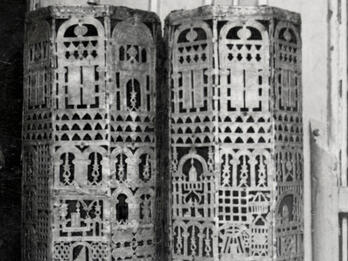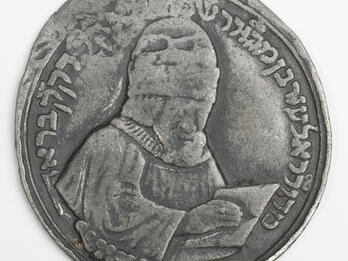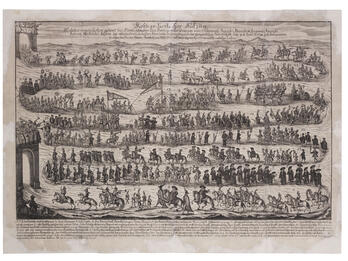Dofi ha-zeman (Chastisements of the Times)
May the Almighty make His vaporous dew fall, for the benefit of His people and His servants, and may He, in His mercy, restore the souls to the deceased. Let him who understands hear, and let him who possesses knowledge listen attentively, for I have already written in the preface that I have no desire to discourse at length concerning vain matters for which there is no need but merely constitute a waste of time, and that I am not going to record all the events that took place from start to finish, but only those which are absolutely essential, as time has not permitted me to do otherwise.
Be aware, then, that in the year 2030, reckoning in accordance with [the calendrical system commencing with the start of the Seleucid era from which] legal documents are dated; that is to say, corresponding to the twenty-eighth year of the reign of our lord, Imam al-Mahdi [Muhammad], there arose a certain king, hailing from the north, who was exceptionally feeble, his name being al-Mansur [al-Husayn]; and he rebelled against our lord, the great ruler al-Mahdi, and sought to strike him down, but failed to strike him down, as his ultimate fate will demonstrate. Now there gathered unto him mighty men of valor from the land of the north, who appointed him king over them as an emergency measure, in order that they could plunder the lands of the west and that Imam al-Mahdi would then buy them off with money—that indeed was their intention—but this feeble ruler did not go out or come in before them [in battle] but remained holed up in a corner, incapable of doing battle; and they went forth to wreak destruction upon the land until they had fulfilled their objective, and they carried away their spoils and returned to their place of residence. And they then took counsel to go against the town of Uzal [Sana’a] to wage war against it and capture it, and sallied forth from their place of residence and destroyed the villages lying in their path day by day, until they reached the town; and they came with a view to laying siege to it until it fell. Now their intention was to remain in the villages surrounding it until such time as its walls had fallen down, but the divine attribute of justice prevailed, and the servants of Imam al-Mahdi sallied forth from the town to do battle against them, and they engaged in battle from mid-day until sunset, with approximately fifty men being slain on each side. And after they had done battle, they could find nowhere to lodge overnight in the desert surrounding Uzal, as it was the design of the Almighty that they should turn back, to lodge overnight in the homes of the Jews. And upon their arrival, the cry of the city rose up to the heavens, and the evildoers were smashing in the entrances of the houses and entering them, for the Jews had fled from each entrance into a single house, and the evildoers searched after them all night long to plunder and take spoil clandestinely, as they were afraid of the son of the imam [i.e., al-Mahdi] who had come along with them, as he did not harbor any desire for such plunder. Now it came to pass that in the morning, the Jews assembled together and cried out to the king’s son, “Why do you behave in this manner toward your servants? Have you come to take spoil? Is it in order to plunder the assembly of your communities?” And he dispatched messengers to take his men out of the homes of the Jews. So the messengers duly took them out in accordance with the order of the king’s son, but it was to no avail as the despoliation had already taken place. And they did as their hearts desired and ruined the city; and when the Jews saw this, they fled with the remaining chattel that they had concealed from those base fellows, but despite all this, they ambushed them on the highways and took captive from them some of the remnant of those who had escaped. And they laid siege to the town for about ten days, and destroyed the houses of the gentiles who dwelt outside the town, and detached the trees in the vineyards. This they would do on a daily basis. And it came to pass that after ten days had elapsed, the Almighty smote them, and they turned back, traveling a distance of one Persian mile, to the city which is called Al-Russa and they stayed there, for their going forth to the town of Uzal had been a mere device, as Imam al-Mahdi had imprisoned the son of the king, who was called Al-Kassam, and he was their confederate. Now it came to pass that when the king heard the report concerning them, he trembled and was affrighted, and took the aforementioned Kassam out of prison on condition that he was to fight against the feeble imam, al-Mansur. And Kassam took counsel with the men of the north, and they entered into a conspiracy to rebel against the great imam, al-Mahdi, with a view to appointing al-Mansur imam. And they waged mighty warfare against Imam al-Mahdi for about two years, and besieged him until such time as they had subdued him.
And it was at the end of two years that they rebelled against the feeble imam al-Mansur, as he was insufficiently powerful to resist, and they appointed al-Qasim imam, and declared, “Long live the King!” And Imam al-Qasim changed his name to al-Mutawakkil. And the great Imam al-Mahdi died in that year; that is to say, in the year 2032 [of the Seleucid era]—the mnemonic for this being: BeL bows down (Isaiah 46:1).1 Moreover, in that year there occurred a famine of such severity that the price of wheat reached four reals, and then the fierce anger of the Almighty abated swiftly.
Notes
[The numerological value of BeL is thirty-two.—Trans.]
Credits
Sa‘id Tsa‘adi, “Dofi ha-zeman (Chastisements of the Times)” (manuscript, Sanaa, Yemen, ca. 1720). Published in: Yosef Kafiḥ, “The Book ‘Dofi ha-zeman,’ of R. Sa’id Sa’adi: Events Befalling the Jews of Yemen during the Years 1717–1726,” Sefunot, vol. 1 (1956/57): pp. 185–242 (191–193).
Published in: The Posen Library of Jewish Culture and Civilization, vol. 5.





